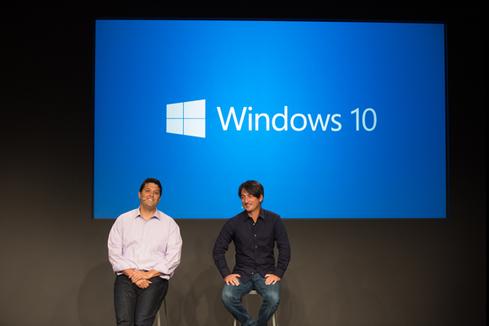Nadella Apologizes For Gender Pay GaffeNadella Apologizes For Gender Pay Gaffe
Microsoft CEO Satya Nadella draws quick criticism for his response to a question about pay gaps between male and female employees.


Windows 10: 11 Big Changes
Windows 10: 11 Big Changes (Click image for larger view and slideshow.)
Since making his public debut as Microsoft CEO last March, Satya Nadella has generally been praised as a thoughtful public speaker. Nadella drew criticism this week, however, when he suggested women should refrain from asking for raises and instead trust that "the system" will reward their hard work. Nadella subsequently apologized for the remarks, calling them "inarticulate" and "completely wrong."
Somewhat ironically, Nadella made the comment at the Grace Hopper Celebration of Women in Computing conference in Phoenix, where he participated in a keynote Q&A with Maria Klawe, president of Harvey Mudd College and a member of Microsoft's board of directors. For much of the talk, Nadella appeared to have a comfortable rapport with the audience, which heard him celebrate the rise of women CEOs in India and praise the unique perspective women bring to traditionally male fields. His remark on pay came during the talk's final 10 minutes.
"It's not really about asking for the raise, but knowing and having faith that the system will actually give you the right raises as you go along," Nadella answered when Klawe brought up the hot-button issue of women being less likely than men to ask for raises. "That's good karma. It'll come back because somebody's going to know that's the kind of person that I want to trust."
[Don't talk yourself out of challenges. Read 'Why Not?': Power Phrase For Women In Tech.]
"I'm not saying that's the only approach," he continued. He said that Mike Maples, the executive under whom Nadella worked when he joined Microsoft, characterized all HR departments as inefficient in the short term but efficient in the long term. This philosophy suggests people might overcome temporary dissatisfaction with pay by focusing on long-term prospects, Nadella said.
Drawing applause from the audience, Klawe responded that pay raises are one of the few issues where she and Nadella disagree. "Make sure you know what a reasonable salary is when you're offered a job. Don't be as stupid as I was," she said after stating that she'd negotiated her salary poorly in the past.
Nadella's response sparked ire on social media. Many pointed out that the "karmic" system Nadella advocated hasn't worked out in practice. According to an oft-cited study by the American Association of University Women (AAUW), women earn only 78% of what equally qualified men are paid. Another recent study concluded women request an average of $7,000 less than men when negotiating salaries.
"It is shameful that Microsoft CEO Satya Nadella would tell women -- especially in an industry that already has a serious problem recruiting and retaining female talent -- not to ask for raises. Wage discrimination costs women and their families close to half a million dollars over their lifetime," said Nita Chaudhary, co-founder of women's activist group UltraViolet, in an emailed statement.
Nadella quickly took to Twitter, where he said he'd been "inarticulate" and that the tech industry "must close the pay gap." He followed up with a letter to employees, posted to Microsoft's website, in which he said his comments were "completely wrong" and that he fully supports efforts to bring more women into technology and close the pay gap. "I believe men and women should get equal pay for equal work," he wrote. "And when it comes to career advice on getting a raise when you think it's deserved, Maria's advice was the right advice. If you think you deserve a raise, you should just ask."
Despite his gaffe, Nadella encouraged employees to watch a video of the event.
Although women continue to earn less than their male peers, evidence suggests tech companies offer more equitable salaries than companies in many other industries. The aforementioned AAUW study notes that engineering and computer science jobs were among the few with relative pay equity. But "relative" equity can still be a slippery concept. A recent study by a Harvard economist found that female computer scientists earn only 89% as much as their male counterparts. Women fared much worse in other industries with high-earning jobs, such as finance and medicine. A recent survey by the website Dice.com similarly found that tech jobs tend to offer equitable pay compared to other industries, but that men still earn on average almost 10% more than women.
Compounding the pay issue, women are still vastly outnumbered by men at most large tech companies. Nadella addressed this point during his Q&A with Klawe, stating that Microsoft has "to figure out how to get women into the organization and... into our development."
It's unknown how well Microsoft's female employees are paid relative to their male peers, or to their counterparts at other tech companies. But in terms of gender representation in the workforce, Microsoft has increased its number of female employees over the last few years and now roughly matches other large players in its industry. According to its most recent disclosure on employee diversity, 29% of Microsoft employees are female, with 17% in technical roles.
information's new Must Reads is a compendium of our best recent coverage of project management. Learn why enterprises must adapt to the Agile approach, how to handle project members who aren't performing up to expectations, whether project management offices are worthwhile, and more. Get the new Project Management Must Reads issue today. (Free registration required.)
About the Author
You May Also Like






